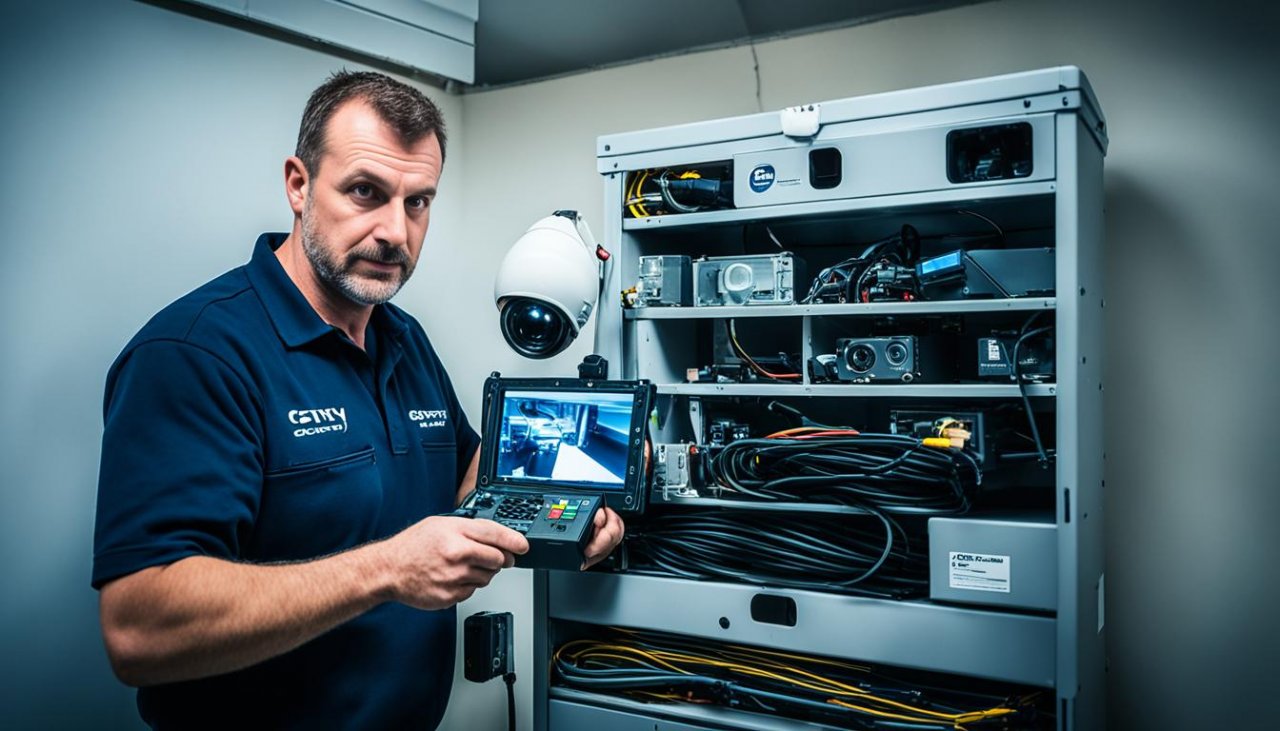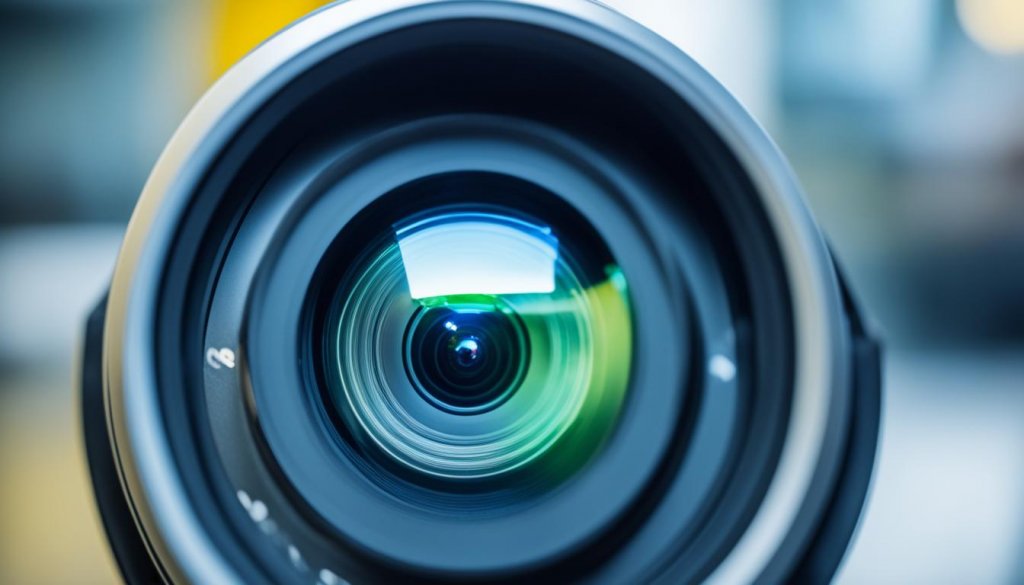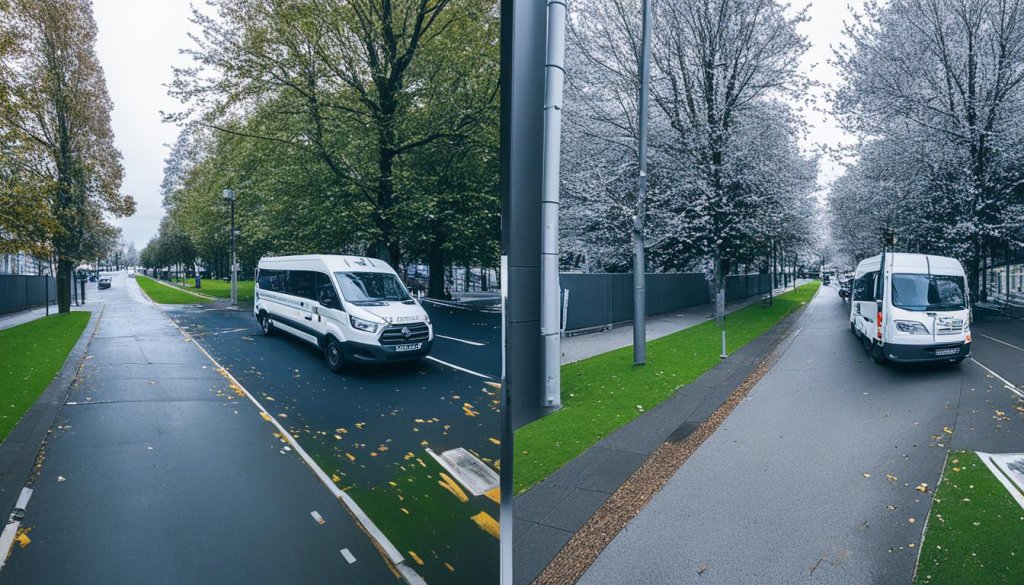Have you ever thought if your surveillance system is really keeping you safe? Or is it just old news? I’ve been looking into upgrading CCTV systems and found it’s key to know when and how to do it. With technology changing fast, it’s time to check if my system is up to date.
Today’s CCTV systems have amazing features. They offer resolutions from 720p to 4K, making images much clearer. Many can store up to 80 terabytes of footage and use the cloud for backup. A 2023 survey showed that new systems cut burglary attempts by 40%. Upgrading is a must to keep my security strong and enjoy perks like watching remotely, motion detection, and better reliability.

Key Takeaways
- Consider upgrading when your CCTV system is over 5-7 years old.
- Modern systems offer superior image quality, including HD and 4K resolutions.
- Newer models can utilize advanced video compression for increased storage capacity.
- Hybrid cloud capabilities enhance data security and recovery options.
- Integrating existing equipment with new systems can still be effective, but assessment is key.
- Wireless systems provide flexible setups, while wired systems often deliver better reliability.
Understanding the Need for an Upgrade
Knowing when your surveillance is outdated can save you time and money. It’s key to keep up with technology to protect your property. I’ve learned that certain signs show it’s time for a new CCTV system. Also, common problems often lead to failures in these systems.
Signs Your CCTV System Needs Replacement
If your CCTV system shows video loss or poor image quality, it’s outdated. Older cameras may not show things clearly, making it tough to spot threats. As technology gets better, older cameras can’t keep up with high-definition images or better night vision.
Older systems also have limited storage, which means they might delete important footage. This can weaken your security.
Common Issues Indicating Failure
Burnt-out cameras and old hardware often point to bigger problems. Older systems have trouble with network compatibility, which limits their use. They also miss out on modern features like remote viewing.
New CCTV systems offer better motion detection and thermal imaging. Knowing these issues helps me decide when to upgrade for better security.
Benefits of Upgrading Your CCTV System
Upgrading my old CCTV system has many advantages. The main one is better image quality and resolution. Now, security cameras can go from 720p to 4K, making it easier to see people and events clearly.
These new cameras work well even in low light. This means I can see more clearly, making my monitoring better.
Enhanced Image Quality and Resolution
Modern CCTV systems give me top-notch image quality. This is key for good monitoring. They have night vision and infrared, so I can watch over my area all the time.
New cameras also fill in blind spots that older ones missed. High-definition images make surveillance better and give me peace of mind. This is especially true when safety is a big concern.
Increased Storage Capacity and Features
Upgrading CCTV also means more storage space. Modern systems use video compression to save more footage without losing quality. This is great because it avoids expensive repairs and worries about running out of space.
With better technology, I can add features like motion detection and real-time alerts. This makes my monitoring work better and more effective.
Evaluating Your Current CCTV Setup
To make sure my CCTV system works well, I need to check it carefully. I start by looking at the video quality and coverage. If the cameras don’t meet the needed standards, I might need to get better ones.
High-definition cameras can make the footage much clearer. This helps with facial recognition and seeing more details. If the video quality is poor, upgrading could be a good idea.
Assessing Video Quality and Coverage
When checking video quality, I focus on a few key things. Clarity and resolution are very important. If the images are blurry or pixelated, it’s hard to see people or objects clearly.
I also look at how well my CCTV system covers different areas. It’s important to have no blind spots. This helps me decide what changes I might need for my system.
Checking Wiring and Cable Types
Looking at the wiring and cable types is also crucial. The right cables affect how well everything works together. I might use RG59 coaxial cables for older systems or Ethernet cables for newer ones.
Each type has its own pros and cons. Knowing what I currently have helps me choose the best options for upgrading. Checking my setup carefully shows me what I need for better security.

When to Consider Upgrading CCTV Systems
Deciding when to upgrade CCTV systems is crucial for better security. It’s important to check how well the system works and look out for new tech. If the current setup doesn’t meet my security needs, it’s time for an upgrade.
Determining Optimal Timing for Replacement
CCTV systems usually last 5 to 6 years. As technology gets better, older systems can’t keep up. Businesses often struggle with poor image quality and limited storage, making surveillance less effective.
Upgrading to newer tech improves image quality and cuts down on maintenance costs. It can change how I manage security by making monitoring easier, improving security, and reducing technical issues.
Impact of Technological Advancements
New tech has changed how I view security. Modern CCTV cameras can record in 4K, giving me clearer footage and better suspect identification. Features like face and motion detection, along with remote monitoring, offer more flexibility.
These updates let me cover more area with fewer cameras, saving money over time. They also make it easier to fix problems and update software, keeping my surveillance strong against new threats.
Choosing the Right Equipment for an Upgrade
When thinking about upgrading my CCTV system, picking the right gear is key. I need to decide between analog and digital cameras and find the best cables for CCTV. These choices affect how well and how good my security setup will be.
Deciding Between Analog and Digital Cameras
Choosing between analog and digital cameras is a big decision. Digital IP cameras have a lot of benefits. They can capture images with much higher quality than analog cameras, which is important for seeing faces and details clearly.
IP cameras also cost more upfront, but they save money in the long run. They have lower maintenance costs and can be easily expanded. This makes them a smart choice for the future.
Selecting Appropriate Cables and Power Supply
Choosing the right cables for CCTV is crucial for my upgrade. The type of cable I need depends on whether I choose analog or digital cameras. Analog systems use coaxial cables, while digital systems use Ethernet cables for better performance.
Many IP cameras use Power over Ethernet (PoE), which means I don’t need extra power cables. This makes installing them easier. A site survey helps me pick the best cables and power supplies. It also helps avoid problems later on.
Steps to Successfully Upgrade Your CCTV System
Upgrading my CCTV system requires a careful plan to make sure it works well. First, I prepare for installation and setup. This step is crucial for getting the best security coverage. I make sure cameras are placed well to see everything without missing spots.
Knowing how to install everything makes the upgrade smoother.
Preparing for Installation and Setup
Before installing the new CCTV systems, I start with a detailed site survey. This shows me what’s good and what’s not in my current setup. I decide if I need analog or digital cameras and where they should go.
I also think about using Power over Ethernet (PoE) to make setup easier. This cuts down on cables. With a solid plan, I’m sure the installation will be a success.
Identifying Necessary Maintenance
After installing, I focus on keeping the CCTV system running well. Regular checks on the equipment are a must. I set up a schedule for maintenance, including checking connections and updating software.
This keeps the system reliable and ready to fix any problems fast. By keeping up with maintenance, my CCTV system stays secure and works well over time.

Maximizing CCTV System Performance Post-Upgrade
After updating my CCTV system, making sure it works its best is crucial. I focus on two main areas: keeping up with software updates and following best surveillance practices. These steps help my system work well for many years.
Regular Software and Firmware Updates
It’s vital to keep my CCTV software updated to improve security and fix bugs. With new threats online all the time, updates help protect my system. They also make my high definition cameras show clearer video.
Getting my system checked once a year by a pro keeps it running smoothly. This helps avoid sudden problems and keeps my system in top shape.
Implementing Best Practices for Surveillance
Using the best surveillance methods makes my system better at monitoring. I place cameras in the right spots to cover important areas well. Checking my storage regularly helps spot and fix issues early.
These steps not only make my CCTV last longer but also save money over time. I don’t need to fix it as often.
Common Mistakes When Upgrading CCTV Systems
When I upgrade my CCTV system, I keep an eye out for common mistakes. These mistakes can affect how well the system works. It’s important to avoid compatibility issues with CCTV devices. Using devices that don’t work together can cause problems that affect security.
Overlooking Compatibility Issues
One big mistake I see often is not checking if new gear will work with what I already have. This can mess up the whole system. It’s key to make sure cameras, DVRs, and NVRs all work together well. Features like motion detection and night vision won’t work right if they’re not compatible.
Checking compatibility before buying can prevent future problems. It’s worth the extra time.
Ignoring Professional Assistance
Trying to install a CCTV system on my own can lead to issues. Many people, including me, don’t realize how complex it can be. Getting help from a pro ensures everything is set up right.
A professional can give advice based on my security needs. This lowers the chance of future problems. Regular checks and expert help keep the system running well.
Conclusion
In my final thoughts on CCTV upgrades, I see it as key to keeping my place safe. Most CCTV cameras last 4-7 years, so checking if my gear is up to date is a must. Upgrading means I get better safety and can tackle threats more effectively.
Switching to digital from analog brings better performance, like higher quality images and wider views. Newer models offer features like watching my place from anywhere and alerting me to movement. These updates also save money over time by reducing upkeep and storage needs.
With security tech always changing, staying current is vital. Upgrading my CCTV keeps my property safe from new dangers and helps me stay ahead in security.
See how FieldAx can transform your Field Operations.
Try it today! Book Demo
You are one click away from your customized FieldAx Demo!
FAQ
How do I know if my CCTV system needs an upgrade?
Look for signs like poor image quality, video loss, or old hardware. If your system doesn’t meet your needs anymore, it’s time to upgrade.
What are the benefits of upgrading my CCTV system?
Upgrading boosts image quality to 720p to 4K. It also increases storage by using advanced video compression. This lets you store more footage without losing quality.
What should I evaluate before upgrading my CCTV setup?
Check the video quality and camera coverage before upgrading. Make sure your wiring and cables are compatible with new equipment for the best performance.
When is the best time to upgrade my CCTV system?
Upgrade when your current system doesn’t meet your security needs or when new tech comes out. Keep an eye on how your system performs as technology changes.
How do I choose the right CCTV equipment to upgrade?
Decide between digital IP cameras and traditional analog cameras based on your needs. Pick the right cables and power supply for your cameras for the best performance.
What steps should I take to upgrade my CCTV system successfully?
Begin with a plan for installation and decide where to place cameras. After setting it up, keep it running smoothly by checking equipment and connections regularly.
How can I maximize the performance of my newly upgraded CCTV system?
Keep your system running well by updating software and firmware regularly. Place cameras strategically and check data storage often to improve reliability.
What common mistakes should I avoid when upgrading my CCTV system?
Don’t ignore compatibility issues with your setup. Getting professional help for installation ensures your upgrade works well and meets your needs.
Author Bio
Co-Founder & CMO at Merfantz Technologies Pvt Ltd | Marketing Manager for FieldAx Field Service Software | Salesforce All-Star Ranger and Community Contributor | Salesforce Content Creation for Knowledge Sharing





